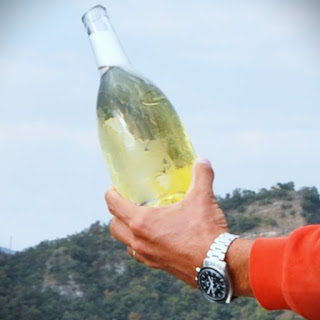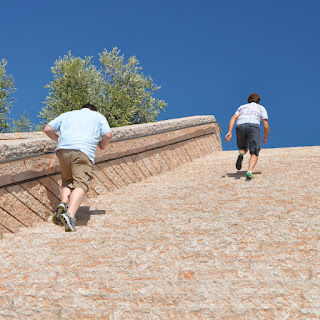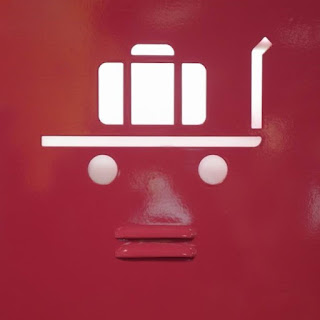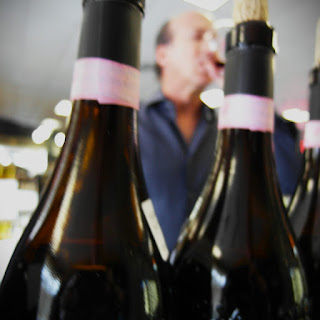Recently, I was introduced as an Italian wine expert. I bristled a little, and explained that at this time I am an enthusiast, and maybe one time I had been a little more involved in the day-to-day business of expertise, but that I have never considered myself an expert. But it got me to thinking about proficiency, and specifically, which person out there might be the #1 Italian wine expert in the world. A tall order, for sure, and one which might be different for different people, in different parts of the world.
For the sake of this speculative
exercise, though, I decided to erect a few hurdles. Here goes:
- They should not have any
kind of affiliation with winery, importer, distributor, retailer or restaurant.
- They should not have any
connection with any government or governmental agency, whether it be Italian,
American, Chinese or any other country.
- They should be free of
any attachment to any kind of awards program, wine competition, ambassador
program, academy or marketing operations.
- They should not have any
connection to any commercial concern that interacts with the Italian wine trade
– that would include public relations, ambassadorships, product endorser, paid influencer
positions or trade show affiliations.
- They should not have any
connection to any road show that Italian wineries participate in, whether it be
gratis or pay-to-play. There should be a firewall between the expert and all
commercial and trade related enterprises which seek to promote the role of
Italian wines.
- They should never take
free trips, junkets or participate in anything that might be seen as trying to
influence the expert from an outside source.
Ok, that’s the list of don’ts. How about the list of dos?
- They should fully
understand the classic traditional wines of Italy, the appellations, the sub-zones, the MGA’s, the DOC/DOCG wines and laws.
- They should also
understand the new and incoming wines and wine styles and be able to place them
in the larger context of Italian wine and what their place in that world is and
where it is going.
- They should thoroughly
understand every region, be fully briefed on the types of grapes Italian wine
is made from as well as all the biotypes that exist and are being discovered in
real time. They should understand the difference between a clone and a biotype
and use the words correctly. Same goes for varieties and varietals.
- While they might be
acquainted with various producers and importers of Italian wine, they should
maintain a professional distance from them so as to not send any message of
collusion, conflict of interest, or violation of anything of an ethical nature.
- They can write about,
talk about, lecture on and even instruct others about Italian wine, so long as
it does not favor any one wine or winery, region or marketing collective. They
should share their knowledge and enthusiasm, by all means, but it should be
objective.
- Rating wine when writing
about them? The 100-point scale has been bastardized by some “experts” to
enrich themselves personally, so I would look for someone who does not abuse
the 100-point scale. I understand why it had become accepted in today’s world,
but I would prefer them not to use it, if at all possible.
So, where does that leave
us? I realize there are a lot of hurdles placed herein, but I think in order to
be the #1 Italian wine expert in the world, they must rise above the fray. Is
there anyone out there? One person comes pretty damn close. Another one might
have been, at one time, in the running. But they are running a larger concern
and that would take away from their overall momentum, and income generating.
Another one claims to be all things to Italian wine, but it comes with a price.
That person has benefited greatly in financial terms, but they also are
getting close to being seen as the George Santos of the Italian wine world.
Don’t expect the Italian government or any of their agencies to foster expertise at this level. There is still too much corruption and the temptation for the money grab is just too great for most people. I understand this, as the EU and Italy often throw so much money around, it’s like going out into the back yard and pulling weeds after a week’s long rain. Unfortunately, with those inclined, when they harness the power that allows them to influence the direction of wine, it usually doesn’t end well for them. Like I said, corruption in the highest levels of Italian wine, at the government level, is part of the tradition of the institution. It’s a shame, but it exists and is quite real.
In a perfect world, this person should be free of any pecuniary encumbrances, therefore able to go about the business of expertise without any concerns for income generating activities. Other than someone in academia, if they were independently wealthy, that would be a plus. But we don’t live in a perfect world, do we?
So, who is out there? Are they Italian? Are they American? Are they from China? Are they in England? Male? Female? Gender fluid? I’d ask for comments, but this is more of a “think on it” piece.
That’s what I’m going to do, over a fresh bottle of Langhe Nebbiolo.
© written and photographed by Alfonso Cevola limited rights reserved On the Wine Trail in Italy
if you must comment, comment here:
https://www.facebook.com/alfonso.cevola/
https://www.instagram.com/alfonso.cevola/







No comments:
Post a Comment